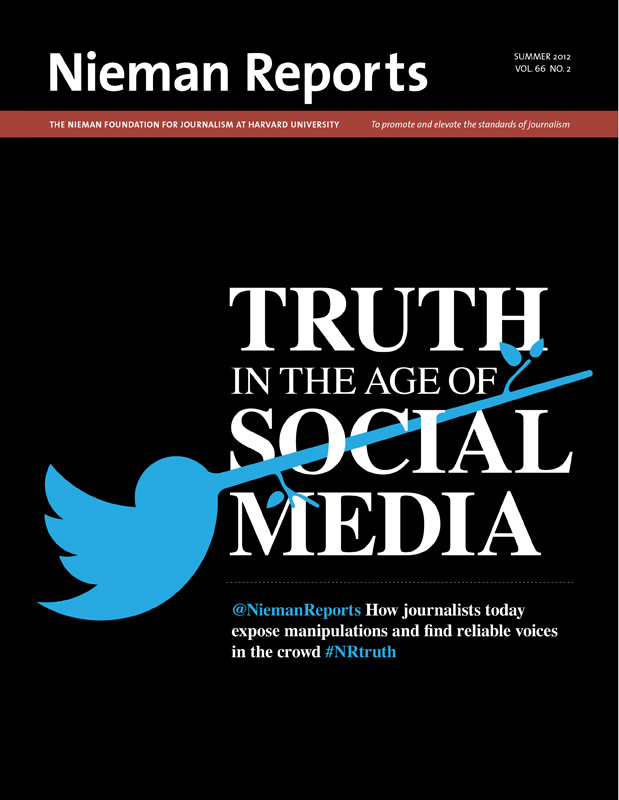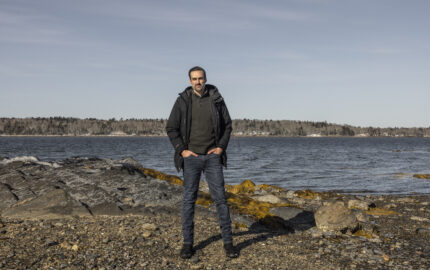
Truth in the Age of Social Media
Verifying information has always been central to the work of journalists. These days the task has taken on a new level of complexity due to the volume of videos, photos, and tweets that journalists face. It’s not only the volume that presents challenges but the sophisticated tools that make it easier than ever to manipulate information. This issue of Nieman Reports looks at how the BBC, the AP, CNN, and other news organizations are addressing questions of truth and verification.
Over the past 30 years, Richard Gingras's work has spanned from broadcast teletext services, the earliest version of online news, to his current role as head of news products at Google. As he puts it, he's been online "since the day of steam-powered modems."
In a talk at the Nieman Foundation in May, Gingras spoke about the transformations media companies must undergo to thrive online. Edited excerpts appear below; a complete video is also available.
Always reconsider your core assumptions.
I do feel these are extraordinary times. I do feel that we, in a sense, are in the beginnings of a renaissance with regard to journalism.
The reason why many entities don't successfully make the transference is that they're not capable of eating their own young, as it were.
The cycle of change is simply too rapid. Innovation is not a luxury; it can't be intermittent. … I fear that many people think that we're in this transition period from a point of stasis to a point of stasis, and it's just not going to be the case.
If there's one thing we know about the link economy, it's that a persistent URL builds value over time and an ephemeral URL does not.
You've got at least one reporter and at least one editor who own every beat, every story. Why don't they own that topic page? Why would you have a rewrite person do that when, frankly, this should be the best real-time expression of the expertise of that reporter and the expertise of that editor? And if anything, it's that page that should spawn whatever articles appear in your print edition, not the other way around.
Transparency regarding the source, right down to the reporter, is hugely important. More important than ever. I do believe that trust in this environment is not so much about the brand as it is about the individual.
Having the right to publish doesn't mean that everyone has the responsibility to listen to you.
If our objective is to communicate, if our objective is to convey information, then we have to think about what's the right form for the right medium at the right time.
When the iPad came out, I came out and said that I thought it was a fatal distraction for media companies. And I still think that's true. … Too many publishers were looking at it, were looking at that tablet, and saying "Ahh, this is how I can get my magazine format back. This is how I can get back my glistening full-page ads that we force people to click through. This is how I can get back that subscription model." The very nature of the change of a singular device does not change the ecosystem under it.
We need to evolve our form to meet the evolution of the underlying audience. I will declare a very modest step of victory when I start seeing news articles maybe even with bullet points in them.
I'm not suggesting that everything must change, but that we owe it to ourselves and to the objectives of what we want to do in journalism to reconsider everything as we go forward.
The bottom line is, I've made more mistakes than anyone else.
In a talk at the Nieman Foundation in May, Gingras spoke about the transformations media companies must undergo to thrive online. Edited excerpts appear below; a complete video is also available.
 |
| Richard Gingras, the head of news products at Google, says, “Innovation is not a luxury.” Photo by Lisa Abitbol. |
Always reconsider your core assumptions.
I do feel these are extraordinary times. I do feel that we, in a sense, are in the beginnings of a renaissance with regard to journalism.
The reason why many entities don't successfully make the transference is that they're not capable of eating their own young, as it were.
The cycle of change is simply too rapid. Innovation is not a luxury; it can't be intermittent. … I fear that many people think that we're in this transition period from a point of stasis to a point of stasis, and it's just not going to be the case.
If there's one thing we know about the link economy, it's that a persistent URL builds value over time and an ephemeral URL does not.
You've got at least one reporter and at least one editor who own every beat, every story. Why don't they own that topic page? Why would you have a rewrite person do that when, frankly, this should be the best real-time expression of the expertise of that reporter and the expertise of that editor? And if anything, it's that page that should spawn whatever articles appear in your print edition, not the other way around.
Transparency regarding the source, right down to the reporter, is hugely important. More important than ever. I do believe that trust in this environment is not so much about the brand as it is about the individual.
Having the right to publish doesn't mean that everyone has the responsibility to listen to you.
If our objective is to communicate, if our objective is to convey information, then we have to think about what's the right form for the right medium at the right time.
When the iPad came out, I came out and said that I thought it was a fatal distraction for media companies. And I still think that's true. … Too many publishers were looking at it, were looking at that tablet, and saying "Ahh, this is how I can get my magazine format back. This is how I can get back my glistening full-page ads that we force people to click through. This is how I can get back that subscription model." The very nature of the change of a singular device does not change the ecosystem under it.
We need to evolve our form to meet the evolution of the underlying audience. I will declare a very modest step of victory when I start seeing news articles maybe even with bullet points in them.
I'm not suggesting that everything must change, but that we owe it to ourselves and to the objectives of what we want to do in journalism to reconsider everything as we go forward.
The bottom line is, I've made more mistakes than anyone else.


